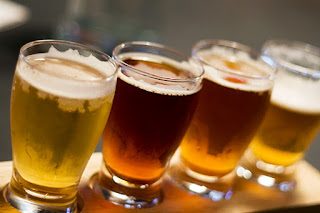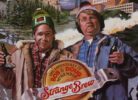yesterday, I pulled out my trusty bow and quiver and, after accidentally killing my pet cat and a small family of nearby chipmunks*, took aim at some pernicious beer myths.
It’s time to take aim at a few more, because there is no better feeling than lording some pointless piece of knowledge over someone in an effort to make yourself feel a little better about your small, sad little life. This selection is perhaps a touch more subjective than the last, but I have the benefit of being right, so I’m not too worried about any subjectivity here.
Here are 5 beer myths you should totally stop believing:
Contract Brewing is Bad
 |
|
Photo courtesy of CraftCan on Photobucket CraftCans |
Contract brewing is something of a dirty word in the world of craft beer. Guys like Jimmy Carbone of Beer Sessions Radio routinely rant about how he refuses to support or respect contract brewed beers. Some have proclaimed it will be the death of craft beer. The idea of contract brewing is simple: you have a beer you want made, and you pay another brewery to make it for you. This may be because you don’t own your own equipment, because your brewery doesn’t have enough capacity, or for other reasons. The bottom line is, contact brewing is when Beer A is brewed down the road at Brewery X instead of by the people who own Beer A. And this really gets some people up in arms.
Which is silly. What matters is what’s in your glass. You can’t taste “passion.” Owning your own brewery or equipment doesn’t magically imbue it with magical properties that turn it into “real” craft beer. And guess what? If you’ve enjoyed some Sixpoint, Terrapin, 21st Amendment, Samuel Adams, Brooklyn, and even for a brief time Russian River, among countless other breweries, you’ve probably enjoyed some contract-brewed beer. (In order to keep up with demand while installing new equipment, Russian River had Firestone Walker brew Pliny the Elder for them.) Contract brewing is a business decision, nothing more, and despite what some idealists would have you believe, craft beer is a business. If the recipe is good and the end result is tasty, that’s all that matters.
Lagers Are Boring
 |
|
These lagers are delicious, you fool! Image from heavemedia.com |
Chat with some beer geeks (especially those just starting their exploration of beer) and you’re bound to run into more than a few people who are quick to proclaim their disdain for boring old lagers. So bland! So dull!
Guess what? You’re probably talking to someone who isn’t as familiar with beer as they claim to be. “Lager” is a broad category, just like “ale,” and it includes many styles. Lagers are simply beers brewed with bottom-fermenting yeast, usually at a colder temperature and often (but not always) stored in cold temps for a time after brewing. Legendary beers like Ayinger Celebrator or Aventinus? Lagers. Landmark smoked beers like Aecht Schlenkerla Rauchbier Urbock? Lagers. Baltic porters? They’re lagers. Marzens aka Oktoberfest beers? Also lagers. Dunkels, schwarzbiers, bocks of all types? Lagers, lagers, lagers. If you really think all those beers are boring, you’re either lying to save face or you have the most one-dimensional palate ever.
IPAs Were Invented To Survive The Trip to India
This one involves a little bit of hair-splitting, but if the Internet was invented for anything, it was for hair-splitting. According to this myth, the beloved India Pale Ale (IPA) was invented by George Hodgson in order to survive the long trip to India, something other beers couldn’t do because they didn’t have the copious amount of hops that IPAs did. He jacked up the ABV and hops to survive the trip, and that was that.
It’s a great story, but it’s not so simple. For this one, I’m going to turn things over to people a lot smarter than I am. First, take a gander at this excellent breakdown of some IPA myths by the outstanding beer historian Martyn Cornell, then throw in this one for good measure. This fantastic post from Beer Church tells the real story in clear terms. And one more to wrap things up from the superb Shut Up About Barclay Perkins. It all boils down to this: Other beers made the voyage to India just fine (especially the ever popular porter) and what evolved into today’s IPA was largely an accident. It was never “invented,” it merely evolved, and even that wording is a bit dubious. So there.
The Guys At (Insert Big Brewery Here) Are Terrible Brewers
 |
|
Mitch Steele, brewmaster at Stone |
Visit any thread on any beer discussion group that happens to mention Budweiser or one of the other mega breweries and inevitably you’ll see a slew of comments about how awful those brewers are, if only they knew how to brew real beer, maybe Bud should hire someone with talent, blah blah frickin’ blah.
There’s no two ways about it: those comments are stupid. The fact of the matter is, the big breweries employ some of the most high skilled, best educated, most thoroughly trained brewers on the planet. Yes, even Budweiser. If they brew boring beer, it’s because it’s their job to — and make no mistake, being able to make every can of Budweiser in America taste exactly the same is really damn hard. Even excellent craft breweries sometimes have some variation from batch to batch. Try doing the same with a beer so “simple” there is no place for off flavors to hide. Further proof can be found in the craft beer world. Mitch Steele, brewmaster at Stone, is just one of many former big brewery brewermasters who have moved into the craft wold (and who have done a killer job at it). Chris Lohring, founder of Notch Brewing, calls the big guys “the most technically proficient brewers in the world.” Basically, hate their beer all you want, but respect the skills of the guys who make it. They’re some of the best, even if their bosses don’t let them show it.
The Big Breweries Use Sub Par Ingredients
|
Hops and barley. Photo by Algerina Perna |
At the risk of being called an apologist for the big brewers — two entries about them in a row will do that, despite this blog being a clear indication of what I tend to drink — I’m going to go ahead and tackle this one. This myth is simple: the big brewers like Coors and Budweiser buy all sorts of cheap, shitty ingredients and bottom of the barrel hops and grains so they can make their lousy beer as cheaply as possible.
Wrong, wrong, wrong. The fact is, those mega brewers have contracts with the same hop and grain producers who provide the ingredients for craft beer. They’ve invested a lot in them. Further, because of the huge volume of business they provide these farmers, they get first dibs on the product — and they’re known to have stringent standards. “Each truckload of barley is sampled and tested at delivery. If it fails to meet company standards for quality, the barley is rejected and likely becomes cattle feed.” Stone’s Mitch Steele has discussed this on podcasts, saying that the folks at A-B were damn near tyrannical about buying the best on the market before anyone else could. And as for the adjuncts, I’ve already addressed that. The finished product may not be for you and me, but it’s not because they’re using lousy ingredients. It’s because they’re tying to reach Joe Six-Pack who just wants to down some beers and watch the game.
So there you have it. Five more beer myths that needed busting. Agree, disagree? Comment down below and give me the validation I crave.
The End.
*This is probably a work of fiction. I probably didn’t kill any animals in the writing of that post. Probably.








Clickbaittastic.
Good click bait.
I look forward to more (and not just beer).
It seems there’s always snobs.
I was really enjoying my merlots for years. Minding my own business, really. Then Sideways came along and I was now a shameful neanderthal.
Fuck me.
But yeah, snobs.
Pingback: Why You Need Real Plants In Your Garden – ERIC SAN JUAN